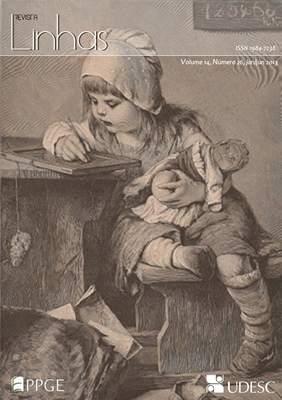A pedagogy for the public: the place of objects, observation, mechanical production and cupboards <em>DOI: 10.5965/1984723814262013244</em>
Resumo
This paper has several significant themes compressed within it: the relation between the organization of mass schooling and its sustenance by simple technologies, the ways in which class and school routines bound objects and actions together, the particular relation between innovators and artifacts, and the economy and method of production of school artifacts. They are ways to approach the constitution of the process of schooling with particular attention to the material context that supported the ways that objects are given meaning within it. In this approach, we emphasize the pedagogic work around object lessons, revealing several meanings, each one connected to wider, but many times distinct analyses on schooling. The mechanic aspects of those tasks could fit in perfectly with the ideas of the Rational Factory and other organizations, since they were created in the XIXth century. The pedagogy of learning implicit in the classes, which, in its own words, was sophisticated, could not be separated from the formalism and the mechanization of that period. Indeed Pestalozzi’s ideas about objects and their use in schooling suggest they became widespread because they were capable of melding in with larger dominant themes about productive organizations and their realization through multiple and accumulating mechanized tasks. The objects, and the necessity to observe and to draw them, fit in with the thesis of technical literacy, a necessary skill in developing workers for the new industrial organizations.Downloads
Downloads
Publicado
Como Citar
Edição
Seção
Licença
Os artigos publicados pela revista são de uso gratuito, destinados a aplicações educacionais e não comerciais. Os direitos autorais são todos cedidos à revista. Os artigos cujos autores são identificados representam a expressão do ponto de vista de seus autores e não a posição oficial da Revista Linhas ou do Programa de Pós-Graduação em Educação da Universidade do Estado de Santa Catarina.

A Revista Linhas está licenciada com uma Licença Creative Commons - Atribuição-NãoComercial-SemDerivações 4.0 Internacional.


